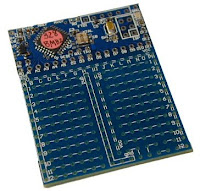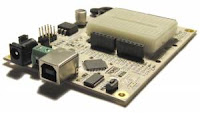We have two pantries in our flat, one of which could use some light.
There's an outlet in there, but a simple solution won't do: I have more circuitry and time on my hands than I can handle, and the least I can do is make an over-complicated pantry light.
Parts lying around to use:
- AC-DC converter blocks with screw-terminals outputting 12V at 2A. I have a bunch of these-- came with the LED strips.
- A length of white LED strip.
- Lots of TIP-120-style MOSFETs, intended for a second light suit. It's fun to have a lot of high power switches around.
- Spare Arduino-compatible boards, including the "StripDuino" by "Tinkeract.com," here I quote the names since links go nowhere.
The idea is simple-- rest your hand on the large strip on the door sill as you scan the pantry contents. The light will turn on if you tap the strip, or it will fade if you leave your hand on it.
This design solves the problem uniquely with:
- Very large switch surface,
- Variable brightness by holding the switch,
- Indirect lighting from compact, dense LED strip tucked out of view.
I have a hardware sketch working in terms of the key elements of the controlling Arduino system:
- Capacitive touch sensing works between pins D5 and D6 with a 1M resistor
- Touch surface works: aluminum foil with soldered wire plus a layer of hot glue and tape.
- PWM works with the MOSFET to control the LED strip nicely, with the board's 3.3V logic.
For the light strip at full power, I measure 240.8 mA at 11.85 V, so 2.85 W of power. This is not much but it scales proportionally to the length of the strip.
To do:
-
Capture the working circuit in an Eagle schematic.
-
Build a looping sketch with the tap/hold fading behavior.
More to come...



